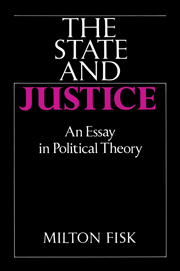Book contents
- Frontmatter
- Contents
- Preface
- Introduction: Can the state rule without justice?
- Part One An outline of a materialist political theory
- Part Two An assessment of the place of justice in the state
- Part Three A functional view of political institutions
- Part Four An account of the community of states
- Part Five A reflection on the transition to a new kind of state
- Conclusion: State, class, and democracy
- Notes
- Index
Part Four - An account of the community of states
Published online by Cambridge University Press: 06 July 2010
- Frontmatter
- Contents
- Preface
- Introduction: Can the state rule without justice?
- Part One An outline of a materialist political theory
- Part Two An assessment of the place of justice in the state
- Part Three A functional view of political institutions
- Part Four An account of the community of states
- Part Five A reflection on the transition to a new kind of state
- Conclusion: State, class, and democracy
- Notes
- Index
Summary
A state's pattern of justice need not stop at its boundaries. Dominant states consolidate their influence by establishing a global justice. This theme conflicts with the view that behavior in the international arena is unrestricted by normative principles. I will be arguing that, just as a state gains legitimacy domestically by accepting limits on losses groups suffer, so too it gains the legitimacy to extend its rule internationally only by putting limits on losses states under its rule suffer. The full picture of state justice requires both domestic and international justice.
To carry through this expansion of the idea of state justice we must first be willing to challenge views that picture states as though they existed in isolation from one another. On these views interconnections between states become accidental features of them. It is an unfortunate fact that much political theory not only has been but still is written in this vein. I shall counter with the view that a global framework enters into what individual states are. States are brought together by the framework not as identical units but as uneven economic powers. This view represents a middle road between two extremes. On the one hand, it does not reduce states to the status of emanations from a global social unity. On the other hand, it gives them autonomy without thereby making their interrelations irrelevant to what they are.
- Type
- Chapter
- Information
- The State and JusticeAn Essay in Political Theory, pp. 219 - 220Publisher: Cambridge University PressPrint publication year: 1989



